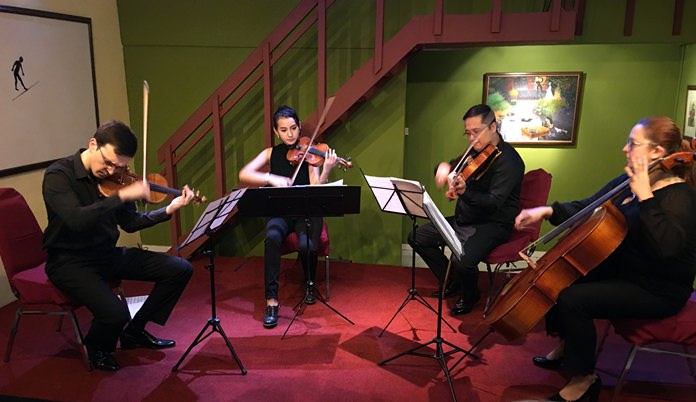
From the first few notes, there was a sense that the audience at Ben’s Theater were in for a magical musical experience.
The work was Samuel Barber’s haunting Adagio from his string quartet, written in 1936 while he was spending the summer in Europe. It has become one of the iconic pieces of the twentieth century. The writer Thomas Larson commented that the movement “evokes a deep sadness in those who hear it.” Alexander J. Morin described the piece as “full of pathos and cathartic passion…which rarely leaves a dry eye.”
Such is the emotive power of the piece that it was broadcast after the announcement of the deaths of Franklin D. Roosevelt and John F. Kennedy. It was played at the funerals of Albert Einstein and Princess Grace of Monaco. In the year of its composition, the composer also made an arrangement for string orchestra and that is the version most often heard.
And so it was a rewarding pleasure to hear the work in its original form for string quartet, in which the separate threads of melody can be more clearly heard. It’s a long melody too, which weaves its way forward as the pitch of the music gradually rises. The tension increases too until the music reaches a breath-taking climax with four sustained chords followed by a long pause. Then it returns to the sublime quietness of the opening and gradually drifts back to the tranquil but slightly unsettling place where it began.
The Thailand Philharmonic Orchestra (TPO) Quartet gave a powerful account of the work and their combined rich string tone was impressive. Omiros and his colleagues are all principal players in the Thailand Philharmonic Orchestra. They’re also a truly international quartet. The leader Omiros Yavroumis is from Greece, violinist Sreewan Wathawathana is from Thailand, viola player Aibek Ashirmatov is from Uzbekistan and cellist Urszula Kopijkowska hails from Poland. Needless to say, they are all highly experienced musicians with many competitions, concertos and years of study already behind them.
The musical adventure continued with one of Haydn’s late quartets. He was pushing seventy when he wrote it, and with dozens of string quartets already published he was a master of the genre. The String Quartet Op 77 No 1 is a captivating work and the robust first movement is full of rhythmic vitality with typical touches of musical humour, fuelled by Haydn’s ever-fertile imagination.
The players excelled themselves in this charming music with excellent sense of phrasing and balance. The lyrical, almost operatic second movement featured superb solo playing from Omiros, with beautifully measured accompaniment from the other strings. The dance-like third movement is packed with musical ideas and in the fourth movement there are some virtuosic octave passages which were played with remarkable precision and drive.
In 1892 at the age of fifty, the Czech composer Antonin Dvorak moved from his native land to become the Director of the National Conservatory of Music in New York. As it turned out, he stayed there only three years but during that time he wrote three of his most successful works, the New World Symphony, the Cello Concerto and the String Quartet No 12 Op 96, popularly known as the “American”. It was to become one of the best-loved works in the repertoire. Many years ago, I often played in this quartet as a music student. The cello, since you asked.
It was the final offering in the TPO Quartet concert and for me it was like meeting an old friend. The work is full of catchy rhythms and lovely melodies, some of which use the five-note pentatonic scale. There are many magic moments too. It’s tempting to compare the tunes with those of the New World Symphony some of which are also pentatonic. Certainly both works share the same joyful and optimistic mood, for Dvorak wrote this quartet during his summer holiday of 1893 in the Iowa village of Spillville, the home of a Czech immigrant community.
The TPO Quartet cast their musical spells yet again in their exuberant performance. The viola solo which dominates the first movement was admirably played by Aibek Ashirmatov and I was impressed by the sensitive playing of the second theme by Omiros Yavroumis. The lyrical second movement shows the composer at his most expressive with some lovely singing cello solos from Urszula Kopijkowska who produces a remarkably sonorous tone. The last movement, with its scampering playful melody and rhythmic drive contrasted with moments of reflective beauty, brought further reminders of the New World Symphony. It was a fitting climax to a brilliant concert.
But a final surprise was to come. The encore piece by the Danish composer Jacob Gade, is one of those numbers that everyone recognises but few can name. It was the familiar Tzigane tango Jalousie, first performed in 1925. Over the years, it earned its composer a fortune. Violinists Omiros Yavroumis and Sreewan Wathawathana gave a captivating performance, ably supported by passionate playing from the lower strings. The ravishing gipsy-style music evidently inspired our host Ben Hansen, who was glimpsed in the semi-darkness dancing a tango of his own. Yes, music can cast spells, sometimes in unexpected ways.
 |
 |
 |





